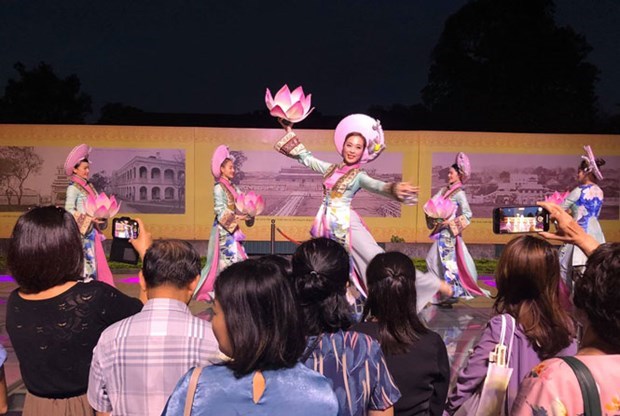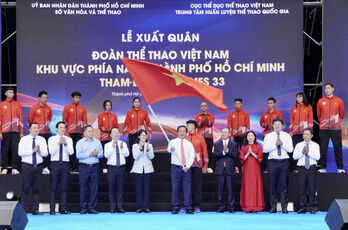
Visitors enjoy a dance on the glass covering the archaeological excavation area at the Thang Long Imperial Citadel as part of the tour last year. (Photo: VNA)
The return will be marked with a special musical programme on April 29 evening when famous piano brothers Luu Hong Quang and Luu Duc Anh, together with other artists, will perform songs celebrating the joy of the national reunification day (April 30, 1975).
The tour, named “Decoding the Imperial Citadel of Thang Long”, was launched in April 2021 by the Thang Long - Hanoi Heritage Conservation Centre and the Hanoitourist travel company. It was available every weekend and received high evaluation from tourists.
Nguyen Thi Yen, head of the conservation centre’s tour guidance division, said the tour is reactivated as part of efforts to recover Hanoi’s tourism. In the time ahead, the centre and Hanoitourist will add new services and experiences so as to make this tour more attractive to visitors.
Travellers will begin their 1.5-hour tour at Doan Mon (Main Gate), the entrance to Cam thanh (Forbidden area) - the king’s residence, and learn about the site’s history, architecture, and functions there.
They will later enjoy an old dance right on the glass covering the archaeological excavation area and gain an insight into this dig, which contains vestiges of the Ly, Tran, and Le dynasties, via tour guides’ introduction. They will also visit an exhibition hall of rare antiquities with some dating back over 1,000 years.
At Kinh Thien Palace, travellers can offer incense to King Ly Thai To, who moved the country’s capital from Hoa Lu in Ninh Binh province to Dai La which he renamed Thang Long in 1010, as well as other kings contributing to the capital’s development.
The last destination of this trip is the archaeological site at No. 18 Hoang Dieu street, where visitors will experience a laser light show of outstanding antiquities of the Thang Long Imperial Citadel. Tourists can take part in a game in which they have to identify typical objects of feudal dynasties in the past./.
VNA
 Send-off ceremony held for sports delegation to SEA Games 33
Send-off ceremony held for sports delegation to SEA Games 33



